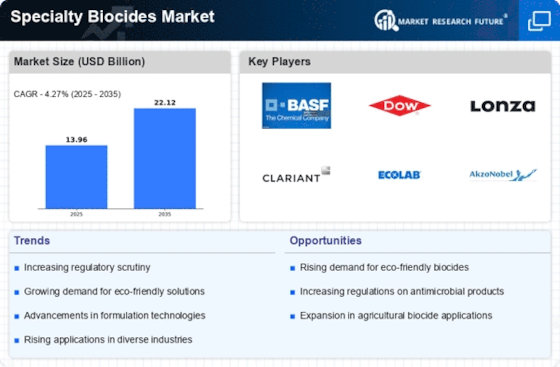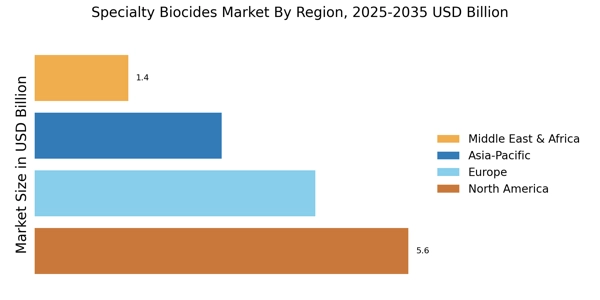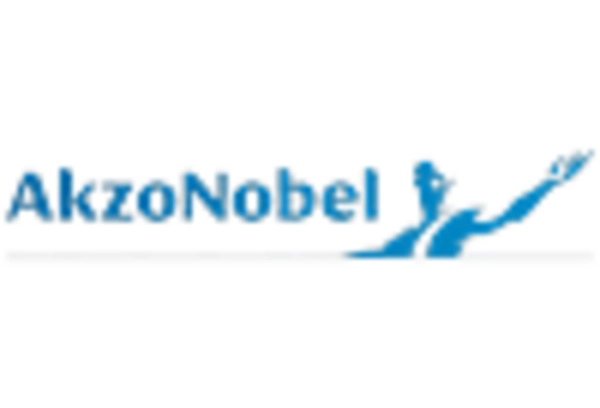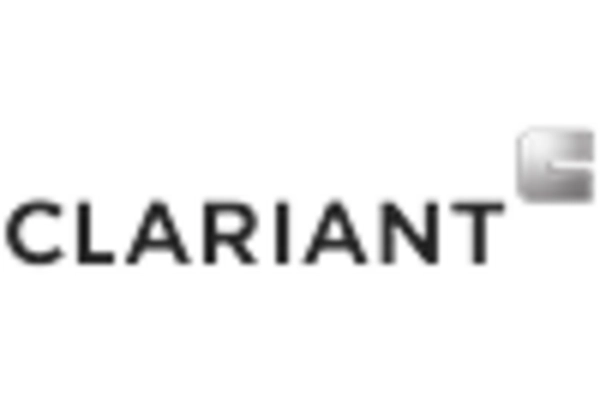Growth in End-Use Industries
The expansion of end-use industries such as construction, agriculture, and water treatment is propelling the Specialty Biocides Market. In the construction sector, biocides are utilized in paints and coatings to prevent microbial growth, thereby extending the lifespan of structures. Similarly, in agriculture, biocides play a crucial role in pest control and crop protection, contributing to increased agricultural productivity. The water treatment industry also relies on specialty biocides to ensure safe drinking water. The cumulative growth of these sectors is anticipated to drive the demand for specialty biocides, with the market projected to grow at a CAGR of 5.2% from 2023 to 2028.
Regulatory Compliance and Safety Standards
Stringent regulations and safety standards imposed by various authorities are significantly influencing the Specialty Biocides Market. Companies are compelled to comply with these regulations to ensure product safety and environmental protection. For instance, the European Union's Biocidal Products Regulation (BPR) mandates rigorous testing and approval processes for biocides. This regulatory landscape not only drives innovation in biocide formulations but also encourages manufacturers to invest in research and development. As a result, the market is witnessing a shift towards safer and more effective biocidal solutions, which is expected to enhance market growth in the coming years.
Increasing Demand for Antimicrobial Products
The rising awareness regarding hygiene and sanitation is driving the demand for antimicrobial products, which is a key driver for the Specialty Biocides Market. As consumers become more health-conscious, industries such as food and beverage, healthcare, and personal care are increasingly incorporating biocides into their products. This trend is reflected in the projected growth of the specialty biocides market, which is expected to reach USD 3.5 billion by 2026. The need for effective antimicrobial solutions in various applications, including coatings and plastics, further emphasizes the importance of specialty biocides in maintaining product integrity and safety.
Technological Advancements in Biocide Formulations
Innovations in biocide formulations are emerging as a pivotal driver for the Specialty Biocides Market. Advances in technology are enabling the development of more effective and environmentally friendly biocides. For instance, the introduction of nanotechnology in biocide formulations is enhancing their efficacy and reducing the required dosage. This not only improves performance but also addresses environmental concerns associated with traditional biocides. As manufacturers continue to invest in research and development, the market is likely to witness the introduction of novel biocidal products that meet the evolving needs of various industries, thereby fostering market growth.
Rising Environmental Concerns and Sustainability Initiatives
The increasing focus on sustainability and environmental protection is shaping the Specialty Biocides Market. Consumers and businesses alike are becoming more aware of the environmental impact of chemical products, leading to a demand for eco-friendly biocides. Manufacturers are responding by developing biocides that are biodegradable and less harmful to the environment. This shift towards sustainable practices is not only driven by consumer preferences but also by regulatory pressures aimed at reducing chemical pollution. As a result, the market is likely to see a rise in the adoption of sustainable biocide solutions, which could redefine industry standards and practices.

















